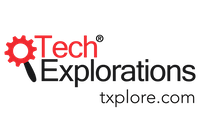[spp-player]

In this episode, Dr. Peter Dalmaris talks with Meridith Ebbs.
Meridith is a teacher with 23 years of experience in K-10 and adult education. She is interested in integrating STEM into classrooms and she is now also working as the NSW Project Officer for the CSER program with the University of Adelaide. She speaks regularly at conferences on Digital Technologies and evolving pedagogies so teachers can future proof the skills of students.
This is Stemiverse episode 13.
Stemiverse podcast is brought to you by Tech Explorations, a leading provider of educational resources for Makers, STEM students, and teachers. Go to techexplorations.com to see a complete list of our books and courses covering the Arduino, Raspberry Pi, and electronics.
Show notes
[spp-timestamp time=”00:00″] Introduction – Introducing Meredith Ebbs
[spp-timestamp time=”01:39″] Meredith talks about her background in Physical Geography, Geomorphology, Biology and Genetics, her Diploma of Education in Primary School Teaching, her work as a Computer Trainer and more
[spp-timestamp time=”05:30″] A comparison of teaching styles between University and Microsoft courses
[spp-timestamp time=”06:50″] When Meredith decided to become a teacher
[spp-timestamp time=”07:44″] Meredith’s experience in teaching during the early years
[spp-timestamp time=”09:41″] Integrated teaching
[spp-timestamp time=”14:03″] Thematic teaching during the 90s
[spp-timestamp time=”15:21″] Capturing the students’ attention
[spp-timestamp time=”15:52″] Using thematic teaching with older students: Project-based learning
[spp-timestamp time=”18:10″] Universities need to reevaluate how they assess students
[spp-timestamp time=”20:36″] What are we preparing students for?
[spp-timestamp time=”22:31″] Portfolio-based entry at the University of Newcastle
[spp-timestamp time=”24:01″] Example of a special education support student who created a remote control for a lawn mower
[spp-timestamp time=”25:24″] Careers in terms of job clusters and transferable skills
[spp-timestamp time=”26:11″] Flexibility in the educational system
[spp-timestamp time=”26:41″] Meredith’s current work at the University of Adelaide
[spp-timestamp time=”29:33″] Teaching Teachers about Computational Thinking MOOC
[spp-timestamp time=”31:35″] What makes computational thinking so important
[spp-timestamp time=”33:09″] The new literacy standard
[spp-timestamp time=”34:22″] Is Australia heading the right way and if so is it fast enough?
[spp-timestamp time=”36:04″] The implications of technology and the social issues that need to be discussed
[spp-timestamp time=”36:36″] Are new-coming teachers ready for the job required of them?
[spp-timestamp time=”37:15″] Advice for a new teacher on how to upskill: MOOCs, mentors, the internet, and social media
[spp-timestamp time=”40:04″] The ways Meredith uses Twitter in the context of her work in education
[spp-timestamp time=”41:52″] Using Twitter as a notebook and storifying twitter chats
[spp-timestamp time=”43:07″] Using Pinterest
[spp-timestamp time=”44:03″] Rapid Fire Questions
[spp-timestamp time=”44:21″] Who has been the most influential in shaping the way you teach: Ada Lovelace
[spp-timestamp time=”45:10″] Ada Lovelace (the first computer programmer) & Grace Hopper (inventor of COBOL)
[spp-timestamp time=”47:36″] Apps you cannot leave without: Social Media
[spp-timestamp time=”49:35″] Professional Development Conferences and Workshops: TeachMeet Sydney & Meetups
[spp-timestamp time=”51:59″] Favorite Books: ‘Hello Ruby’ and Andrea Beaty’s Books
[spp-timestamp time=”51:59″] Meredith’s Contact Information: CSER Digital Technologies Education

